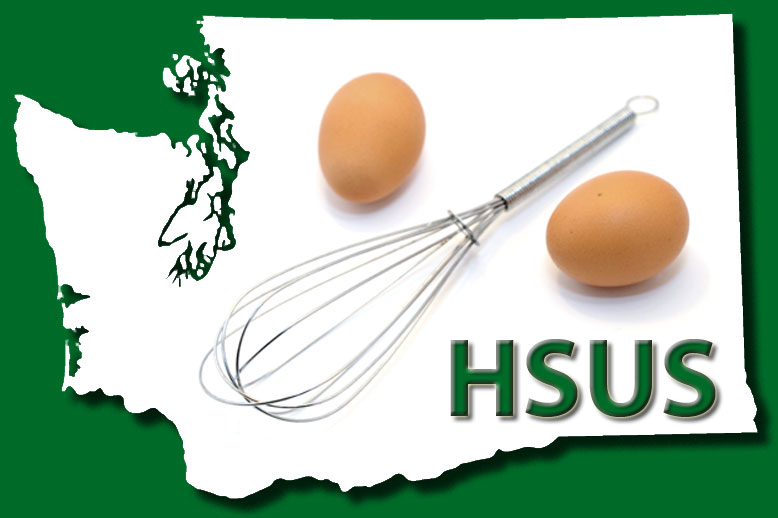Egg Choices, Begone!
Following on “Californians for Humane Farms,” “Ohioans for Humane Farms,” Arizonans for Humane Farms,” “Missourians for the Protection of Dogs,” and other cash-cow front groups, a new astroturf organization run by the Humane Society of the United States (note the URL) sprung up yesterday in the state of Washington.
It calls itself—wait for it—“Washingtonians for Humane Farms.” How original.
But if you’re thinking that this is going to be another replay of the 2008 “Proposition 2” in California, think again. This ballot initiative is more far-reaching, and twice as odious.
The language in California’s “Prop 2” was all about how chickens were to be kept. If it ever actually gets implemented, it will require Golden State farmers to provide egg-laying hens with enough room to turn around freely, lie down, stand up, and fully extend their limbs.
When HSUS’s lawyers wrote this language, they probably saw it as self-evident that egg farmers would have to completely get rid of their cages in order to comply. That thinking turned out to be wrong. The language is so vague that one California egg producer is going to court to guarantee approval of its “enriched” cages—the kind the American Humane Association approves of, and of which Temple Grandin says “that’s where producers need to head.”
After Prop. 2 passed, HSUS came back with another California law—this one making it illegal to sell an egg that wasn’t produced according to Prop. 2’s restrictions. This approach has “Unconstitutional” written all over it. (That pesky Commerce Clause…) But unless someone challenges it in federal court, it’s set to become California law in four years.
The measure that HSUS unveiled yesterday wraps all these developments into one big hassle:
-
Notwithstanding any other provision of law, a farm owner or operator shall not knowingly confine an egg-laying hen:
- in a manner that prevents the hen from turning around freely, lying down, standing up, or fully extending her wings; or
- in a cage that is stacked or otherwise placed on top of or below another cage confining one or more egg-laying hens.
- A person shall not knowingly sell or offer for sale any shell egg for human consumption that is the product of an egg-laying hen confined in a manner contrary to the prohibitions of subsection (1) of this section.
It’s all in there: No cages, no eggs for sale that were produced in cages, no cost-saving efficiency of any kind. And don’t get us started about the increased mortality rates of the chickens, once they’re let loose to live in big flocks. (Remember them? The chickens?)
There’s lots to talk about in this story beyond just how lousy HSUS’s preferred farm system is for the animals that inhabit it.
For starters, why is HSUS hosting a mirror of its “Washingtonians for Humane Farms” website at the Internet domain of what looks to be a real-live political (i.e., electoral) campaign?
Visit KennethLewisForSenate.com and you’ll find yourself back at the anti-agriculture campaign’s website, instead of at the campaign site of the former U.S. Senate candidate from North Carolina. (Here’s a screen-shot, just in case HSUS cleans this up.)
No, we don’t understand what this means either. It’s just kinda creepy.
Also, Wayne Pacelle (or his staff) wrote yesterday that “We have fewer than six months to gather more than 300,000 signatures of Washington voters.” The actual number looks to be around 242,000 signatures. (That’s 8% of the number of people who cast votes for governor the last time Washington elected one.)
Activists will need to collect the signatures from registered voters and turn them in by July 8 in order to get the issue on the ballot in November. HSUS’s Paul Shapiro told the Associated Press last night that HSUS (in the reporter’s words) “will rely on an extensive network of volunteers to gather signatures.”
If you believe that, we have some really tasty vegan rack of lamb for you to taste. Every anti-animal-agriculture ballot campaign HSUS has run in recent years depended on paid signature-gatherers to get the job done. This one will probably be no different.
In any event, the odds are seriously stacked against HSUS in the state of Washington, where very few initiatives that are filed ever become “certified” for the ballot. Last year, 77 measures were proposed, of which nine made it to the ballot (and only four passed). In 2009, 23 measures were filed and just one was certified. (The voters rejected it). In 2008, 57 measures were filed and voters saw just three on Election Day. (They approved two and rejected one. )
HSUS’s ballot initiative text hasn’t hit the Washington Secretary of State’s website yet, but there are already 15 different initiatives proposed. It’s going to be another crowded field, and Washington residents are going to get “signature fatigue” pretty quickly.
All of which bodes well for chickens, and for consumer choice.
We’re of the opinion that the politics of food tend to be intensely personal, and that people should have lots of choices. Reasonable people will, of course, have reasonable disagreements about chicken welfare, so consumers should be able to choose what they want to buy when they shop. There’s a place for ordinary eggs, for cage-free, for free-range, and whatever else comes down the pike. Buy whatever your values (and your income) suggest, even if that leads you to opt for no eggs at all.
HSUS’s approach is to force the options it doesn't like out of the marketplace, leaving everyone with fewer choices and more expensive food. We disagree with that plan, and we hope most Washingtonians do too.




